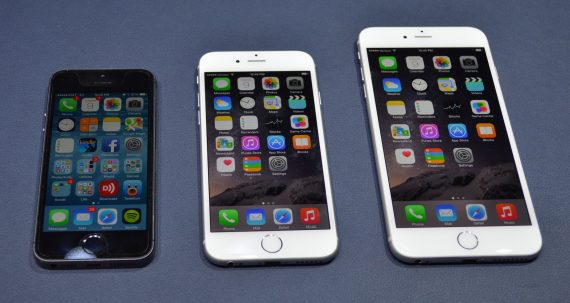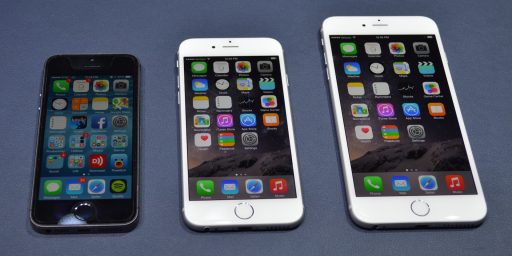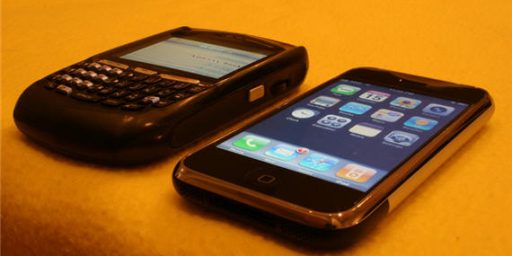Federal Judge Denies Request To Force Apple To Extract Data From iPhones In Drug Case
A Federal Judge in New York has denied an F.B.I. request to force Apple to extract data from iPhones involved in a Federal drug case.
A Federal Magistrate Judge in New York City has sided with Apple in a case regarding the efforts of Federal law enforcement to force the technology company’s to develop a tool to unlock an encrypted iPhone that is evidence in a Federal drug case currently pending in Federal Court in New York:
A federal magistrate judge on Monday denied the United States government’s request that Apple extract data from an iPhone in a drug case in New York, giving the company’s pro-privacy stance a boost as it battles law enforcement officials over opening up the device in other cases.
The ruling, from Judge James Orenstein in New York’s Eastern District, is the first time that the government’s legal argument for opening up devices like the iPhone has been put to the test. The denial could influence other cases where law enforcement officials are trying to compel Apple to help unlock iPhones, including the standoff between Apple and the F.B.I. over the iPhone used by one of the attackers in a mass shooting in San Bernardino, Calif., last year.
Judge Orenstein, in his 50-page ruling on Monday, took particular aim at a 1789 statute called the All Writs Act that underlies many government requests for extracting data from tech companies. The All Writs Act broadly says that courts can require actions to comply with their orders when not covered by existing law. Judge Orenstein said the government was inflating its authority by using the All Writs Act to force Apple to extract data from an iPhone seized in connection with a drug case.
The government’s view of the All Writs Act is so expansive as to cast doubt on its constitutionality if adopted, Judge Orenstein wrote.
The All Writs Act is also being invoked in the fight over an iPhone in the San Bernardino shooting, which has publicly pitted Apple against the government. Apple’s chief executive, Timothy D. Cook, has refused to comply with a federal court order to help break into the phone, saying that he needs to protect the data of all customers. That has set off a far-reaching debate over privacy and security.
Both the F.B.I. and Apple have called for Congress to step in to help settle the question of when law enforcement should get access to citizens’ private data. On Tuesday, Apple’s general counsel, Bruce Sewell, and James B. Comey, the F.B.I. director, will testify about balancing privacy and safety before the House Judiciary Committee.
“It’s important that a judge for the first time recognizes the All Writs Act doesn’t provide the lawful authority the government has been claiming in these cases,” said Esha Bhandari, a lawyer with the A.C.L.U., which supports Apple’s position. “It demonstrates that when the government’s arguments are put to the test, a federal court has decided they were not actually right.”
In a statement on Monday in response to Judge Orenstein’s ruling, the Justice Department said it would ask the judge to review the decision. Apple had previously agreed to help open up the iPhone in the drug case, and has complied with past All Writs Act orders, the Justice Department said.
“This phone may contain evidence that will assist us in an active criminal investigation, and we will continue to use the judicial system in our attempt to obtain it,” the Justice Department said.
An Apple senior executive said Monday’s ruling makes clear that helping to open an iPhone is a constitutional issue that should be taken up by Congress.
Judge Orenstein’s ruling stands out because the courts have largely been absent on the major questions of electronic surveillance and privacy of our day. While judges around the country have signed at least 70 orders at the request of the government compelling Apple to access data on phones, this was the first time that a judge and Apple have pushed back.
The legal back and forth between Judge Orenstein, the Justice Department and Apple began last October, when federal prosecutors applied for a court order to force Apple to unlock an iPhone 5s seized by the Drug Enforcement Administration in a 2014 drug case, according to court documents.
After federal prosecutors requested the order, Judge Orenstein argued in an 11-page memo last October that prosecutors were misusing the All Writs Act. The judge asked Apple to weigh in, and the company filed a brief that same month. In addition to agreeing with the judge, the company also said the request could create an undue burden and threatened to “substantially tarnish the Apple brand.”
“This reputational harm could have a longer-term economic impact beyond the mere cost of performing the single extraction at issue,” Apple said in a brief.
The government then called Apple’s decision to side with the judge a “stunning reversal.” Saritha Komatireddy, a Brooklyn federal prosecutor, said the government’s application in this case “was just a simple routine request for assistance in carrying out a valid search warrant issued by a federal court, as Apple has done so many times before.”
During the case, Judge Orenstein said he found it puzzling that Apple had not previously resisted the use of the All Writs Act, including in other cases where Apple had complied with the order.
“You have had apparently 70 prior instances where you have not taken the steps available to you,” Judge Orenstein said to Apple’s lawyers during a hearing.
Ultimately, Judge Orenstein argued that the government couldn’t use the All Writs Act to ask Apple to help extract information from a device just because a different law, the Communications Assistance for Law Enforcement Act, or Calea, addresses the issue and does not include an “information services” company like Apple. Congress has been debating whether to amend Calea to include tech companies such as Apple, Facebook and Alphabet’s Google.
More detail on the underlying cases from The Washington Post:
The two cases involve different versions of iPhone’s operating system and vastly different requests for technical help, but they both turn on whether a law from 1789 known as the All Writs Act can be applied to cases in which the government cannot get at encrypted data stored on suspects’ devices.
Magistrate Judge James Orenstein in Brooklyn, who sits in the Eastern District of New York, has become the first federal judge to rule that the act does not permit a court to order companies to pull encrypted data off a customer’s phone or tablet.
In a 50-page opinion disdainful of the government’s arguments, Orenstein found that the All Writs Act does not apply in instances where Congress had the opportunity but failed to create an authority for the government to get the type of help it was seeking, such as having firms ensure they have a way to obtain data from encrypted phones.
He wrote that the government’s interpretation of the 200-year-old law was “absurd” in that it would authorize what they were seeking even if every member of Congress had voted against granting such authority. It would, he added, undermine “the more general protection against tyranny that the Founders believed required the careful separation of governmental powers.”
He also found that ordering Apple to help the government by extracting data from the iPhone — which belonged to a drug dealer — would place an unreasonable burden on the company.
None of the factors he reviewed in the case, Orenstein said, “justifies imposing on Apple the obligation to assist the government’s investigation against its will.”
A Justice Department spokeswoman said the department was disappointed in the ruling and would appeal. “As our prior court filings make clear, Apple expressly agreed to assist the government in accessing the data on this iPhone — as it had many times before in similar circumstances — and only changed course when the government’s application for assistance was made public by the court,” spokeswoman Emily Pierce said in a statement. “This phone may contain evidence that will assist us in an active criminal investigation and we will continue to use the judicial system in our attempt to obtain it.”
(…)
The Brooklyn case began last fall when Orenstein, one of a handful of magistrates across the country who are activists in the surveillance debate, received the government’s application to issue an order to Apple.
What seemed like a routine request — after all, this was a phone using an operating system, iOS7, that Apple had bypassed for the federal government at least 70 times before — suddenly hit a roadblock. In an Oct. 9 ruling, Orenstein identified what he thought was a problem with the government’s argument. Though prosecutors cited a 1985 decision that found that the All Writs Act is a source of authority to issue writs “not otherwise covered by statute,” he said they failed to cite another part of the decision that found that the act does not authorize the issuance of “ad hoc writs whenever compliance with statutory procedures appears inconvenient or less appropriate.”
Thus, he said, the question was whether the government was seeking to fill a gap that Congress had failed to consider, or instead sought to have the court give it authority that Congress chose not to confer.
He noted that since at least the mid-1990s, Congress has debated how far the government may go to require companies to help it with surveillance and wiretap capabilities. In fact, a 1994 law, the Communications Assistance to Law Enforcement Act, was a compromise that applied only to phone companies and later to broadband carriers, but it expressly carved out Internet companies.
And he noted that last year, lawmakers introduced bills that precluded the government from forcing companies such as Apple from building in ways to circumvent encryption on devices. The Obama administration last fall decided it would hold off on introducing such legislation.
Thus, Orenstein wrote last fall, the drug-dealer phone case “falls in the murkier area in which Congress is plainly aware” of the lack of a law that expressly authorizes the type of help the government was seeking, and had “failed” to create or reject such a law.
The ruling in these cases, of course, brings to mind the matter pending out in California in which another Federal Magistrate Judge has already issued a preliminary order compelling Apple to help the Federal Government gain access to a locked, encrypted iPhone used by one of the two terrorists responsible for the San Bernardino shootings in December. In that case, as in this one, the Federal Government is seeking to use the All Writs Act to compel Apple to create a tool that would essentially act as a backdoor around the encryption that would allow the F.B.I. to apply its “brute force” technology to determine the lock code for the phone without being limited by a security feature that would erase all the data on the phone after ten unsuccessful attempts. Apple has resisted the efforts and continues to litigate the California matter arguing that the Federal Government’s interpretation of the All Writs Act is overly broad, that search warrants cannot be used to compel a respondent to create something that does not exist case, in this case a piece of software or other device that would essentially create a backdoor into the security and encryption features built into iOS, and that doing what the Federal Government is asking would essentially give law enforcement a back door to access every encrypted iPhone on the planet regardless of whether or not they had a warrant. The F.B.I., of course, has taken the position that it needs access to the phone to continue its investigation of a terrorist attack and has responded to Apple’s concerns about the future implications of developing the technology by saying this is a single request in a unique case. Of course, the fact that the Federal Government is making nearly identical requests of Apple three thousand miles away in a different Courtroom and relying upon the same nearly 230 year old law would make that assertion a bald-faced lie, but there have been reports that there are dozens of other cases in various stages of investigation in which similar requests are being made of Apple and other technology companies raises questions about just how truthful the Federal Government is being in the California litigation. In any case, the issues raised in the California case have proven to be sufficiently alarming to Silicon Valley that pretty much every technology company of note is filing legal briefs in support of Apple’s position.
As I noted when I wrote about the San Bernardino case, it seems clear to me that Apple has the better argument here under applicable law. Even accepting for the sake of argument that there ought to be a way for law enforcement and intelligence agencies to access encrypted information in appropriate situations, it’s not at all clear that existing law gives Courts the authority to do what law enforcement wants them to do in these cases, or that the All Writs Act is the appropriate method by which to compel action by technology companies. In the wake of the first reports about the California case, Orin Kerr published a long piece at The Volokh Conspiracy that explains the long history of the All Writs Act and how it has been interpreted by the Courts over the past two centuries, with special attention to how it has been applied to telecommunications-related issues. Kerr’s basic conclusion is that it is utterly unclear whether Apple or the F.B.I. has the better argument in the case arising out of the San Bernardino attack, largely because nobody has ever asked for the All Writs Act to be used in this manner before. To me, this suggests that Courts ought to err on the side of caution and decline to extend the Act to cover something like what the F.B.I. is asking for here, especially given the implication that doing so could give law enforcement the power to access any phone in the country at will. If Congress wants to attempt to give law enforcement the power to do this, it can prepare and debate legislation that does just that and force the people’s representatives to take a stand on this issue, even though there’s a fairly solid argument that any such legislation might be unconstitutional. That, however, is an argument for another day.
Judge Ornstein’s order is not binding on the Judge in the California case, of course, but it is hopefully something that he and future courts that consider these types of cases will consider as persuasive in coming up with an answer in the case that ends up before them. Eventually, of course, both of these cases will be appealed to higher courts, and this issue will ultimately likely make it to the Supreme Court, which has only just begun sorting out the issues involved in determining how to balance the legitimate needs of law enforcement and the intelligence community with the Constitutional rights and privacy interests of American citizens. Because there will be more cases like these in the future.
Here’s the opinion:







Wow. We went really fast from “this tool will only be used for this one case because of terrorism” to “let’s use this in a drug case”. As I’ve said a million times, the War on Terror is mainly a testbed for civil liberties violations they want to uncork on all of us.
It also turns out that the FBI were the ones who demanded the iPhone be locked in the first place. And now they’re bitching that Apple can’t with existing tools make the thing unlocked again.
(Facepalm)